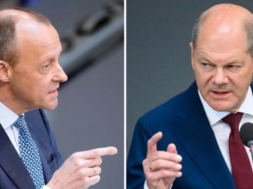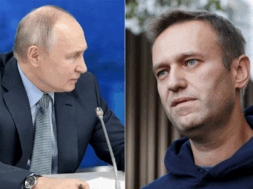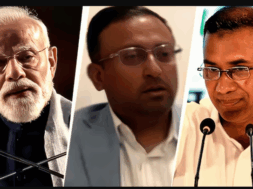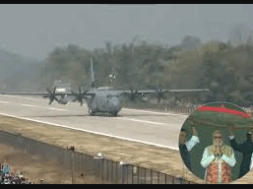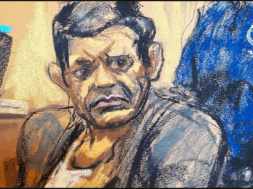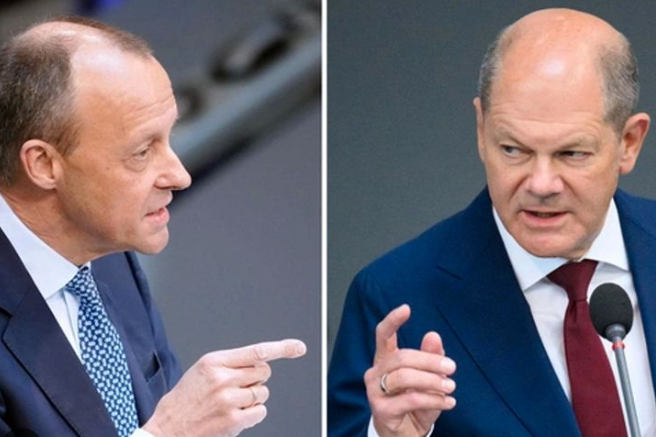
Europe: After the UK and France, Germany may also witness a ‘regime change’
Virendra Pandit
New Delhi: Ensconced in their revolving chairs, many politicians do not realize how unpopular they have become. Misconstruing public silence as popular support, they often try to extend their stay in power—and bite the dust.
The electors wait to give a fast spin to their chairs!
That’s what happened when the then British Prime Minister Rishi Sunak, believing that a marginal price fall would make him win the parliamentary election, ordered one and lost. That’s what happened when French President Emmanuel Macron ordered snap elections and found two of his chosen PMs fall within a few months this year.
And that’s what just happened in Germany as well.
Already unpopular, Left-liberal-centrist Chancellor Olaf Scholz, who lost a snap confidence vote in parliament on Monday, was forced into calling for fresh polls on February 23, 2025.
Out of the Bundestag deputies, 394 voted against him while only 207 expressed confidence in the chancellor, with 116 abstentions. Scholz was expected to lose the vote after his three-way coalition fell apart last month.
Interestingly, Scholz had requested the confidence vote himself as his fractious three-party coalition government crumbled after the Free Democrats (FDP) dumped his center-left Social Democrats (SPD), and so did the Greens, after disputes over the budget. Losing the vote, he meekly requested the President to dissolve the parliament, triggering fresh elections.
The confidence vote took place as the post-World War II German Constitution did not allow the Bundestag to dissolve itself. German President Frank-Walter Steinmeier has the power to do so.
This was only the sixth time in its postwar history that a chancellor had called for a confidence vote. The last was in 2005 when then-Chancellor Gerhard Schröder engineered an early election that was narrowly won by center-right challenger Angela Merkel, the media reported on Tuesday.
Scholz’s unpopular government collapsed when he tried to sack his finance minister in a dispute over revitalizing Germany’s stagnant economy. In opinion polls, he already lags behind conservative opposition leader Friedrich Merz of the Christian Democratic Union (CDU) of former Chancellor Angela Merkel.
His failed leadership has attracted harsh criticism, making him one of the least popular chancellors in decades. Scholz has struggled to revive a sagging economy hammered by high energy prices following the Russian invasion in February 2022 of Ukraine and tough competition from China.
Scholz is the “face” of a failed government marked by perpetual disputes, news magazine Der Spiegel said. He is “probably the weakest, most unsuitable candidate for the chancellorship that the SPD has ever put forward”, it said.
In the lower house of the parliament, Scholz clashed with opposition leader Merz while outlining his plans for massive spending on security, business, and social welfare. He accused the previous CDU governments of leaving the armed forces in a “deplorable state.”
“It is high time to invest powerfully and decisively in Germany,” Scholz said, warning about Russia’s war in Ukraine that “a highly armed nuclear power is waging war in Europe just two hours’ flight from here.”
Merz shot back by saying that Scholz had left the country in “one of the biggest economic crises of the postwar era.” The opposition leader, who has been open to sending the long-range missiles, said that “we don’t need any lectures on war and peace” from Scholz’s party.
“You’re standing here and saying, business as usual. Let’s run up debt at the expense of the younger generation, let’s spend money, and… the word competitiveness’ of the German economy didn’t come up once in the speech you gave today,” Merz added.
The troubled political landscape in Germany is also because of the rise of the far-right Alternative for Germany (AfD) party, which has seen strong performances in regional elections give it a national boost. Their growing popularity signals a shift in Germany’s political dynamics, where far-right parties were considered taboo due to the dark history of World War II.
